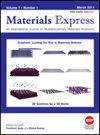Regulatory mechanism of LINC00657/MiR-26b in the TNF-α/NF-κB pathway for the progression of colorectal cancer
IF 0.7
4区 材料科学
Q3 Materials Science
引用次数: 0
Abstract
This study investigates the effect of long-chain non-coding LINC00657 on cell proliferation and apoptosis in colorectal cancer and its molecular mechanism based on magnetic nanocarriers for gene delivery. Tumor tissues were collected from patients with colorectal cancer (CRC) to examine the expression of LINC00657. Magnetic nano microspheres were prepared and CRC cells were transfected with short hairpin RNA (shRNA) targeting LINC00657 to establish a stably transfected cell line. The binding relationship between LINC00657 and MicroRNA-26b (MiR-26b) was also verified using a dual-luciferase gene reporter assay. The expression of LINC00657 and MiR-26b were determined by qRT-PCR and Western blot. Cell proliferation, migration, and apoptosis were assessed. Our findings reveal that LINC00657 is highly expressed in CRC tissues and cells, significantly promoting hepatoma carcinoma cell proliferation and migration. Furthermore, we demonstrate that MiR-26b can target and bind to LINC00657, while its expression decreases in CRC cells. Knockdown of LINC00657 resulted in significant downregulation of both MiR-26b expression levels and tumor necrosis factor-α (TNF-α)/nuclear factor-kappa B (NF-κB) pathway activity. However, co-transfection of a MiR-26b inhibitor into sh-LINC00657-transfected cells attenuated the effects on malignant phenotypes while activating TNF-α/NF-kB pathway activity. Conversely, transfection of an NF-kB activator exerted similar effects as the MiR-26b inhibitor by enhancing malignant proliferation ability in CRC cells. Overall, the upregulation of LINC00657 potentially modulates the proliferation and apoptosis of colorectal cancer cells through its interaction with MiR-26b, leading to the activation of the TNF-α/NF-κB signaling pathway.LINC00657/MiR-26b在TNF-α/NF-κB通路中对结直肠癌进展的调控机制
本研究探讨了长链非编码LINC00657对结直肠癌细胞增殖和凋亡的影响及其基于磁性纳米载体基因递送的分子机制。收集结直肠癌(CRC)患者的肿瘤组织,检测 LINC00657 的表达。制备磁性纳米微球,并用靶向 LINC00657 的短发夹 RNA(shRNA)转染 CRC 细胞,建立稳定转染细胞系。还利用双荧光素酶基因报告实验验证了 LINC00657 与 MicroRNA-26b (MiR-26b) 之间的结合关系。通过 qRT-PCR 和 Western 印迹检测了 LINC00657 和 MiR-26b 的表达。对细胞增殖、迁移和凋亡进行了评估。我们的研究结果表明,LINC00657 在 CRC 组织和细胞中高表达,能显著促进肝癌细胞的增殖和迁移。此外,我们还证明了 MiR-26b 可以靶向 LINC00657 并与之结合,而其在 CRC 细胞中的表达则会降低。敲除 LINC00657 后,MiR-26b 的表达水平和肿瘤坏死因子-α(TNF-α)/核因子-kappa B(NF-κB)通路活性均显著下调。然而,在转染 sh-LINC00657 的细胞中同时转染 MiR-26b 抑制剂可减轻对恶性表型的影响,同时激活 TNF-α/NF-kB 通路的活性。相反,转染 NF-kB 激活剂也能产生与 MiR-26b 抑制剂类似的效果,增强 CRC 细胞的恶性增殖能力。总之,LINC00657的上调可能通过与MiR-26b的相互作用,导致TNF-α/NF-κB信号通路的激活,从而调节结直肠癌细胞的增殖和凋亡。
本文章由计算机程序翻译,如有差异,请以英文原文为准。
求助全文
约1分钟内获得全文
求助全文
来源期刊

Materials Express
NANOSCIENCE & NANOTECHNOLOGY-MATERIALS SCIENCE, MULTIDISCIPLINARY
自引率
0.00%
发文量
69
审稿时长
>12 weeks
期刊介绍:
Information not localized
 求助内容:
求助内容: 应助结果提醒方式:
应助结果提醒方式:


